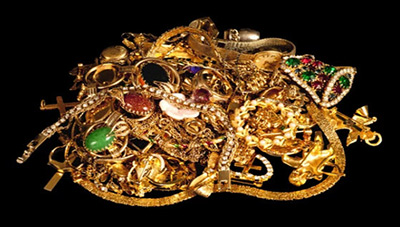Millennials Pay Rent By Selling Their Parents' Jewelry
Tyler Durden
 With the market just shy of all-time highs, it would be reasonable for one to assume, looking at nothing else, that the American economy is wonderful. One may even wish to ponder the joyous thought of a younger generation living better than their parents. The problem is that the youth of America are saddled with debt and the university they took on the debt to attend left them with a lacking skill-set after graduation. With the market just shy of all-time highs, it would be reasonable for one to assume, looking at nothing else, that the American economy is wonderful. One may even wish to ponder the joyous thought of a younger generation living better than their parents. The problem is that the youth of America are saddled with debt and the university they took on the debt to attend left them with a lacking skill-set after graduation.
So what's an American youth to do? Aside from perhaps investing it in a Ghost Skyscraper.
Call Provident Loan Society of New York and pledge your family heirlooms for rent money.
That's how all great economies work right? The New York Post reported earlier that Provident's chief of marketing Scott Watson spoke with Post reporter Lisa Fickenscher and said his firm, which secures microloans with valuable jewelry, has seen volumes increase 8% this year. He added that most of his clients are in their mid-thirties.
Provident Loan Society of New York - a nonprofit that provides microloans secured by valuable jewelry - reports that the number of new customers applying for loans is up 8 percent year-to-date compared with 2015.
“These are people who have inherited jewelry and might have a shortfall on their rent or a medical bill,” Scott Watson, chief marketing officer, told our Lisa Fickenscher. Upper East Side-based Provident was founded by J.P. Morgan and Cornelius Vanderbilt in 1893.
Provident is holding an auction on July 12 at Doyle New York of baubles belonging to borrowers who either couldn’t pay off their loan or chose not to.
Among the items is an 18-karat gold Bulgari bracelet with 24 diamonds for an estimated $5,000.
Not shocking in lieu of what we said one month ago, almost to the day:
According to CLSA economists, who have updated an analysis we first did in the summer of 2010, if the participation rate stayed at the levels before the financial crisis, the unemployment rate would be 9.6%, more than double what it is today.
But hey, as long as we're not clear on what data we're "data dependent" on, reality is whatever you want to make it be but when the bills comes due and you can't afford it, you may be asking Do I Need A Roomate?
 our mission: our mission:
to widen the scope of financial, economic and political information available to the professional investing public.
to skeptically examine and, where necessary, attack the flaccid institution that financial journalism has become.
to liberate oppressed knowledge.
to provide analysis uninhibited by political constraint.
to facilitate information's unending quest for freedom.
our method: pseudonymous speech...
Anonymity is a shield from the tyranny of the majority. it thus exemplifies the purpose behind the bill of rights, and of the first amendment in particular: to protect unpopular individuals from retaliation-- and their ideas from suppression-- at the hand of an intolerant society.
...responsibly used.
The right to remain anonymous may be abused when it shields fraudulent conduct. but political speech by its nature will sometimes have unpalatable consequences, and, in general, our society accords greater weight to the value of free speech than to the dangers of its misuse.
Though often maligned (typically by those frustrated by an inability to engage in ad hominem attacks) anonymous speech has a long and storied history in the united states. used by the likes of mark twain (aka samuel langhorne clemens) to criticize common ignorance, and perhaps most famously by alexander hamilton, james madison and john jay (aka publius) to write the federalist papers, we think ourselves in good company in using one or another nom de plume. particularly in light of an emerging trend against vocalizing public dissent in the united states, we believe in the critical importance of anonymity and its role in dissident speech. like the economist magazine, we also believe that keeping authorship anonymous moves the focus of discussion to the content of speech and away from the speaker- as it should be. we believe not only that you should be comfortable with anonymous speech in such an environment, but that you should be suspicious of any speech that isn't.
www.zerohedge.com
|




